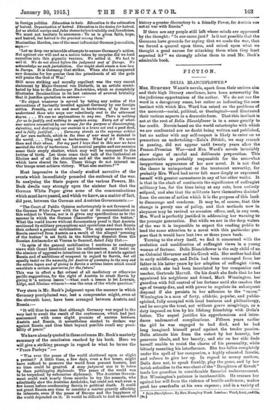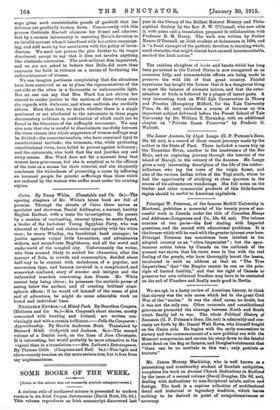FICTION.
DELIA. BLANetirLOWEIL8 Man HITE:MUM Wasn't; novels, apart from their serious aim and their high literary excellence, have been noteworthy fet the judicious opportunism of the author. We do not use the word in a derogatory sense, but rather as indicating the sure instinct with which Mrs. Ward has seined ou the problems of the moment—social, political, or theological—and illustrated their various aspects in a dramatic form. That this instinct is not at the root of Delia Blanelylower is in a sense greatly to her credit. Novels based on the world catastrophe with which we are confronted are no doubt being written and published, but no author with any self-respect is likely to enter ou so premature an undertaking—Zola's Ddbdck, we may remark in passing, did not appear until twenty years after the Franco-Prussian War—and Mrs. Ward's novels invariably show signs of careful and deliberate preparation. This characteristic is probably responsible for the somewhat inopportune appearance of her new novel. It is not that the theme is unimportant or the treatment unworthy, for probably Mrs. Ward had never felt more deeply or expressed herself with greater earnestness in any of her other works. It is that in the olaeh of continents the significance of suffragist militancy has, for the time being at any rate, been entirely eclipsed, and also that the militants have themselves desisted from the course of action which it is the purpose of Ibis book to discourage and condemn. It may be, of course, that this change is purely one of policy, and that methods now in abeyance may be revived as occasion offers, and, in any ease, Mrs. Ward is perfectly justified in addressing her warning to the younger generation. But while we are in the deep waters of the war it is impossible to expect the reading public to lend the same attention to a novel with this particular pur- pose that it would have lent two or three years back.
Turning to the story itself, we find it concerned with the evolution and modification of suffragist views in a young woman of fortune. Delia Blanchllower is the only child of an ex-Colonial Governor and his Greek wife. Her mother had died in early middle-age, and Delia had been estranged from her father in his latter years by her adoption of suffragist views, with which she had been inoculated by her companion and teacher, Gertrude Marvell. On his death she finds that Le Las appointed his neighbour and friend, Mark Winningtou, her guardian with full control of her fortune until she reaches the age of twenty-five, and with power to regulate its subsequent disposal if she persists in her adhesion to the "cause." Winnington is a man of forty, athletic, popular, and public- spirited, fully occupied with local business and philanthropy, and he accepts the trust, not without grave misgivings, as a duty imposed on him by his lifelong friendship with Delia's father. The sequel justifies his apprehensions and intro. duces undreamt-of complications. Fifteen years earlier the girl he was engaged to had died, and he Lad long imagined himself proof against the tender passion. Delia attracts him from the outset by her honesty, her generous ideals, and her beauty; and she on her side finds herself unable to resist the charm of his personality, while bitterly resenting his interference. She bas fallen completely ender the spell of her companion, a highly educated fanatic, and refuses to give her up. In regard to money matters, Delia does not, to speak frankly, play the game, and hy her lavish subsidies to the war-chest of the " Daughters of Revolt" lands her guardian in considerable financial embarrassment. But Winnington's patience is inexhaustible. He rescues her against her will from the violence of hostile audiences ; makes good her overdrafts at his own expense; and in a variety of • Delia Manehilmer. By Sara HamyhryWard. London: Ward.Loet,untION, 0.1
ways gives such unmistakable proofs of goodwill that her defences are gradually broken down. Concurrently with this process Gertrude Marvell alienates her friend and admirer. first by a certain inhumanity in resenting Delia's devotion to an invalid servant when it interfered with her active campaign- ing, and still more by her association with the policy of incen. diarisin. We need not pursue the plot further to its tragic denoitment, except to say that it does not involve anything like wholesale conversion. The arch-militant dies impenitent, and we are not asked to believe that Delia did more than renounce her faith in violence as a means of furthering the enfranchisement of women.
We can imagine partisans complaining that the situations have been contrived no as to place the representatives of the one side or the other in a favourable or unfavourable light. But no one can say that Mrs. Ward has not striven her utmost to render justice to the motives of those whose aims she regards with disfavour, and whose methods she cordially abhors. More than that, we doubt whether there is a single sentiment or act attributed to the extremists in these pages documentary evidence in confirmation of which could not be found in the literature of the suffragist movement. We may also note that she is careful to discriminate carefully between the three classes into which supporters of woman suffrage may be divided—the constitutionalists, who have remained loyal to constitutional methods; the trimmers, who, while professing constitutional views, have failed to protest against militancy ; and the extremists, who hold that the cud justifies any and every means. Mrs. Ward does not for a moment deny that women have grievances, but she is sceptical as to the efficacy of the vote as a means for their removal, and she eloquently condemns the wickedness of promoting a cause by inflicting on innocent people far greater sufferings than those which are endured by the women who suffer most under the existing rlyinte.



















































 Previous page
Previous page